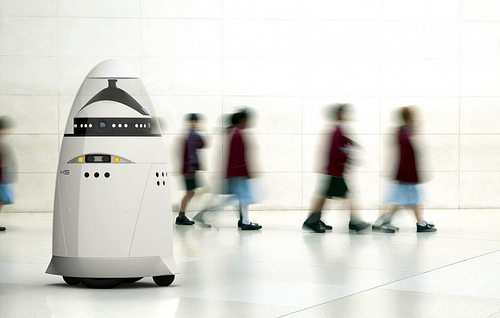The Robocop of parking pits safety against privacy and jobs
The 2014 remake of Robocop opens nationwide today, but the public won’t meet its real-life counterpart for at least another year. That’s because K5, the diminutive robot set to police shopping malls, corporate campuses, and other public places, isn’t set for the assembly line till 2015.
Sneak previews of the bot will be available for some, though. Beginning next month, Knightscope, the seven-person startup behind K5, will test the five-foot-tall, 300-pound machines at a dozen parking lots. “One of the things we’re working on with our beta customers: the ability to detect empty parking spaces,” said Stacy Stephens, Knightscope’s marketing chief and a former officer with the Dallas police department.

Parking proprietors eyeing the Knightscope parking ‘droid may end up telling themselves, “I’ll buy THAT for a dollar.” From Viet Fuji.
The K5, which debuted late last year, will rely on built-in lasers that capture up to 270 degrees to photographically map the area it’s monitoring in 3D. Its four, mid-mounted cameras with optical-character recognition will also allow the K5 to scan up to 1,500 license plates per minute, while sensor technology will allow the bot to travel at an average speed of 5 mph to avoid bumping into people and objects.
With abilities so daunting, Knightscope wanted to insure that the all-seeing watcher bot appears approachable, cute even. “We wanted to be more like R2D2 and much less like Terminator or Robocop,” said Stephens of the bullet-headed, mostly white K5.
“There’s no reason the K5 shouldn’t see you passing by and greet you or whistle as it wheels along,” added William Li, Knightscope’s CEO. “It’s the friendly robot that’s trying to help.”
But not everyone has cottoned to the idea of an autonomous police-bot-cum-parking-valet. “This kind of surveillance technology has an unbounded capacity to collect personal information that a single patrol officer doesn’t,” said Marc Rotenberg, executive director of the watchdog group Electronic Privacy Information Center.
Citing similar concerns over closed-circuit television and Google’s ability to map cars, he continues, “Laws need to be updated to acknowledge these technologies, and companies, in turn, need to act responsibly. To just say, ‘Get used to it,’ is not an answer.”
Such critiques agitate Li. “There are 7 billion people on the planet, and we’ll soon have a few billion more, and law enforcement is not going to scale at the same rate. We literally can’t afford it,” he said after explaining how the shooting and deaths at Sandy Hook Elementary in 2012 provided the inspiration for the K5.
The K5 prompts other worries: job loss for private security officers, a subject still sensitive in the fragile US economy. “There is no substitute for human beings when it comes to rapidly analyzing information and making a swift decision,” said Bill Johnson, executive director of the National Association of Police Organizations. “Technology is useful, but it can’t be a substitute.”
Li, describing the assignment of private security officers as “miserable jobs with turnover of 400 percent,” reemphasized the dividends in safety that the K5 promises. “With big data and predictive analytics, we might be able to avoid some of these terrible tragedies we seem to read about every day,” he said.
Related Posts
Category: News, Parking Tech

















